Monomorium pharaonis
What kind of creature can spread human diseases and drink from the mouths of babes in hospitals? The pharaoh ant!
These nightmarish insects (Monomorium pharaonis) were originally named pharaoh’s ants because they were mistakenly thought to have been one of the plagues of ancient Egypt.
Although originally from the tropics (and therefore a huge problem in Florida and Texas), this species readily infests heated buildings in cold climates, so it is a menace throughout the US.
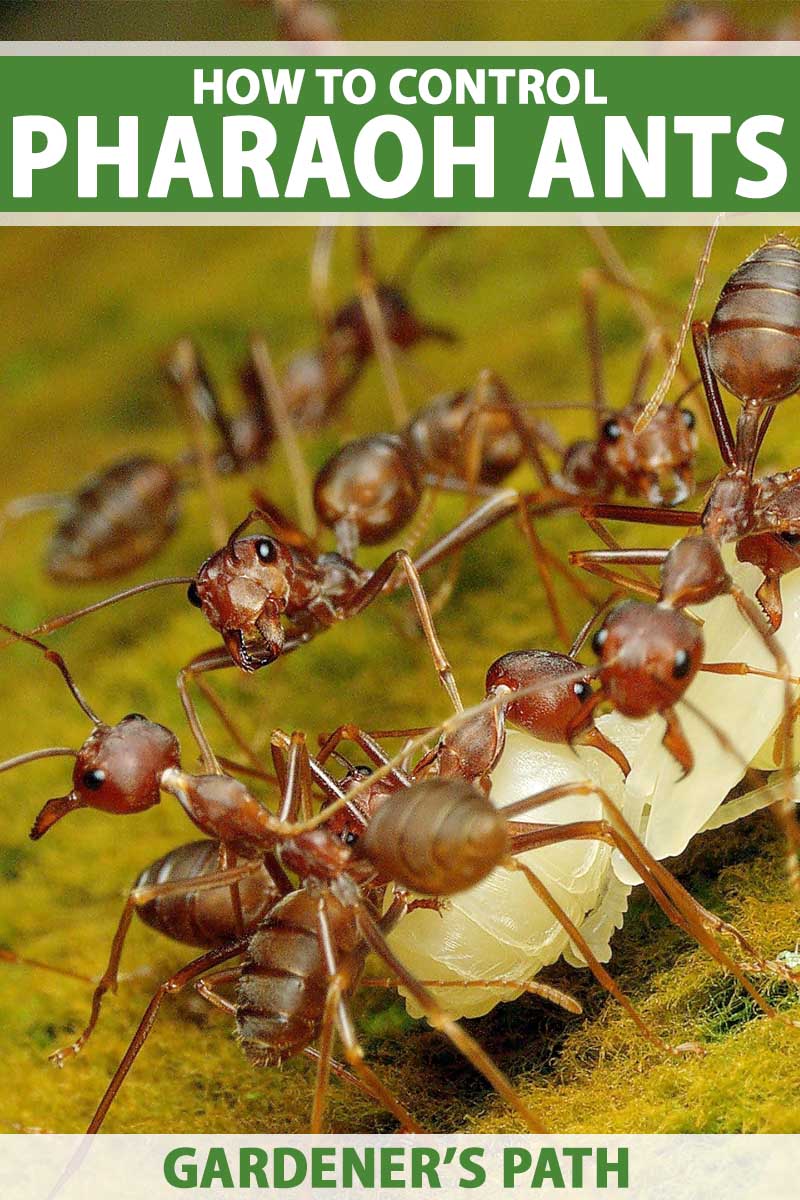
We link to vendors to help you find relevant products. If you buy from one of our links, we may earn a commission.
For reasons that we will describe, these troublesome insects are extremely difficult to control.
Read on to learn more about these tiny but fearsome creatures.
What You Will Learn
Why Pharaoh Ants Take Over So Easily
Pharaoh ants are very efficient at colonizing new territory and driving out the native species.
One of the main reasons that they can do this is the tendency of their colonies to spread by “budding.” What this means is that groups in one colony can just split off and start a whole new colony without having to swarm and start over.
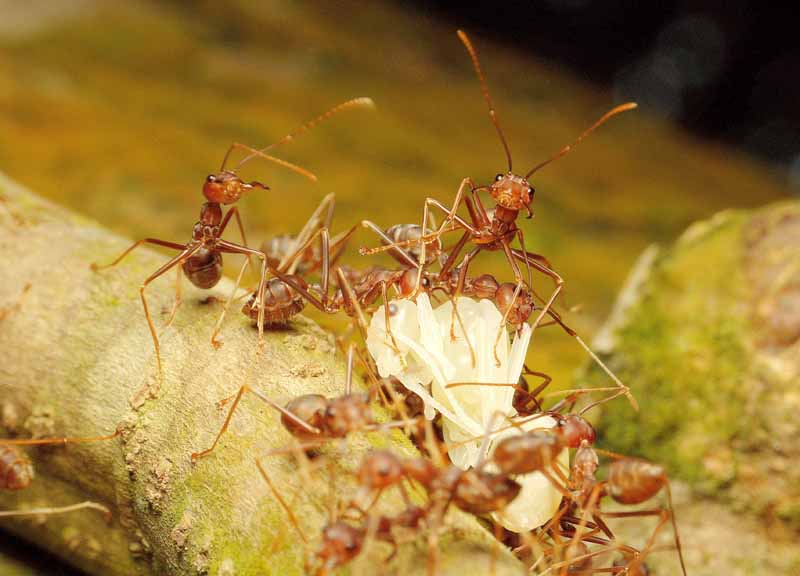
They don’t even need a queen to start with. Workers can develop one, and this makes it even easier for groups to separate and start new colonies.
And unlike other ant species, which typically fight to the death when in adjoining colonies, pharaoh ants tend to get along with each other.
If you disturb them, they can just move their colony to another place.
In addition, they frequently survive conventional treatments to kill them. And the spread of colonies within a building makes it even more difficult to kill all of them simultaneously.
These factors make them such effective colonizers that the Texas Invasive Species Institute described their ability “to quickly invade and conquer new areas.”
How They Spread Pathogens in Hospitals
The ability of pharaoh ants to live inside extends from houses, apartments, and office buildings to hospitals and nursing homes. And they behave very badly!
They are so aggressive in their quest for water that they have been found drinking from the mouths of infants in hospitals or even from IV bags in use.
Since they have been found to harbor more than a dozen different human pathogens, including Salmonella, Streptococcus, Staphylococcus, and Pseudomonas aeruginosa, this is not a trivial matter.
This issue was first brought to light in a 1972 article in the prestigious medical journal the Lancet, which described the ability of the species to carry pathogens.
Regrettably, it is still a problem today. With their tiny size, it is virtually impossible to keep them out of hospitals. Their infestations are critical problems in both European and American hospitals.
Unlike most other species, they don’t need soil to live in, so they live readily in buildings in wall voids, electrical sockets, and even between sheets of linen.
They are particularly dirty and will crawl from the rims of toilet boils and inside drains back up to hospital food.
They can even infest maternity incubators and like to feed on the skin of burn victims!
Identification
How can you be sure that the ants infesting your yard or house are of the pharaoh variety? They are often mistaken for the Argentine ant.
Pharaoh ants are tiny – think 1/12 to 1/16 inches long. They are paler in color than many other invasive species – typically golden yellow to reddish brown. However, their abdomen is often much darker than the rest of the body.
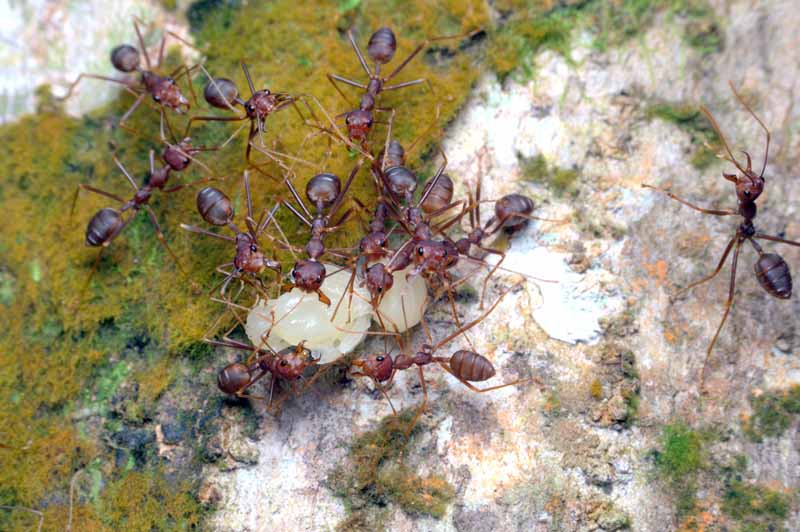
The antennae of pharaoh ants have 12 segments forming a club of three segments at the end. In contrast, the antennae of Argentine ants have 12 segments, but the first one is as large as its head.
Distribution
No one is positive, but scientists generally think that the pharaoh ant originated from Northern Africa.
However, it has spread widely. As early as 1910, entomologists had noted that the species had spread throughout the inhabited world by trade.
This species is known as a common household pest throughout the world.
They require warm weather, but this does not stop them from being pests throughout the US due to their ability to readily live inside buildings.
However, they are a particular problem in the south. The Texas Invasive Species Institute states that Florida has “especially large numbers of” them and that they are the most commonly occurring indoor variety in Texas.
Biology
Pharaoh ants like warm, moist locations, so they are typically found in temperatures of 80 to 86 F and 80% humidity.
Their colonies can contain as few as a dozen ants to as many as several hundred thousand individuals.
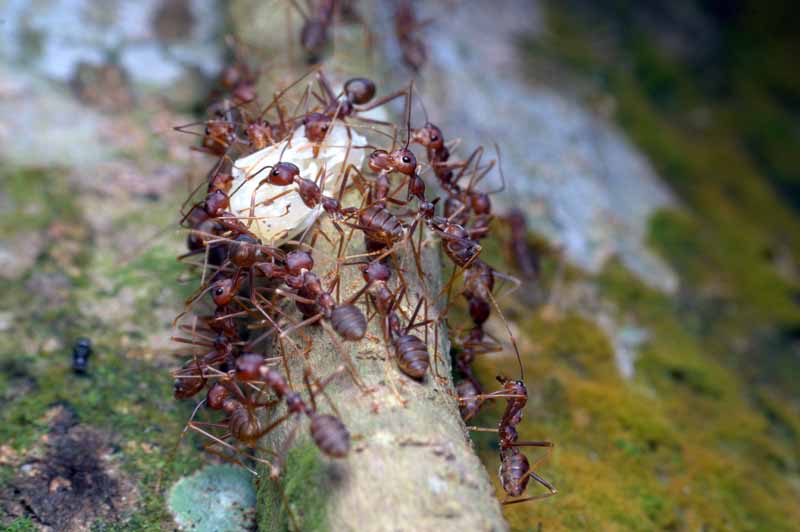
As described previously, they have the unusual ability to spread their colonies by readily budding off and starting new ones.
Unlike most ants, this species does not swarm, so mating takes place within the nest.
The queens can live 4-12 months and produce as many as 400 eggs over their lifespans. Large colonies may have as many as several hundred females that can reproduce!
It takes about 38 days for workers to develop from eggs to adults.
Pharaoh Ant Nests
In warm climates, they can nest in your lawn or garden. You can often find them under debris.
Inside, pharaoh ants are amazingly versatile with their nests. These sites range from wall voids and areas around hot heating pipes to insulation, the hollows of curtain rods, within and behind kitchen appliances, and behind baseboards.
They will even nest under flooring or near hot water pipes in heating systems.
They will often travel between floors and through walls using hot water pipes or wiring.
If you leave fatty, sweet, or oily food out for even a short period of time, if you have an infestation, you will probably find a trail of ants to it.
If you attack them with insecticidal sprays, they will just split up into larger numbers of colonies and make your life even worse.
Controls
Many factors result in the designation of pharaoh ants as either one of the most or the most difficult type to control.
In addition to their tendency to bud off and start new colonies, the foraging workers are usually far away from their colony.
People often try to kill any they see. However, since the visible ones are only a small proportion of the colony, most will remain unscathed.
Ant Baits
Slow-acting baits are likely to be your best bet to control these troublesome critters. The foragers will collect them and take them back to their colony where they will kill the queen and the other workers.
However, given the tendency of these pests to have multiple nests, this can be a difficult strategy. If you live in a building with apartments, the whole building will have to be treated simultaneously.
And it is critical to treat ceilings, walls, floor voids – and even electrical wall outlets.
You need to make sure that in addition to their trails, you find the nests that are the original sources of the infestation.
The best baits to control pharaoh ants contain proteins or sweets. You should use non-repellent insecticides, such as fipronil, boric acid, or hydramethylon.
You should realize that it can take weeks for the baits to kill all of the colony.
Sanitation
Keeping your kitchen and garbage cans clean and free of food is important for two reasons. First, you are less likely to attract the ants. Second, they will be less likely to be distracted by the food and more likely to select the bait.
While you are probably focused on your sink and counters, don’t forget to pick up any pet foods at night.
Also throw away any infested food, since pharaoh ants can spread diseases like Salmonella.
Consider Professional Help
Given the difficulty of eradicating pharaoh ant infestations, you may want to bring in a licensed pest professional to help you control these wretched creatures.
If you do, be sure to describe where the ant trails are located both inside your house and in your yard.
From Africa to Your Yard or Kitchen
Pharaoh ants have been recognized as being invasive throughout the world for the past century.
They are such problems that they were named after a biblical plague!
This tropical species from Africa are tremendous pests in warm climates like Florida and Texas, but they will also nest inside buildings throughout the US.
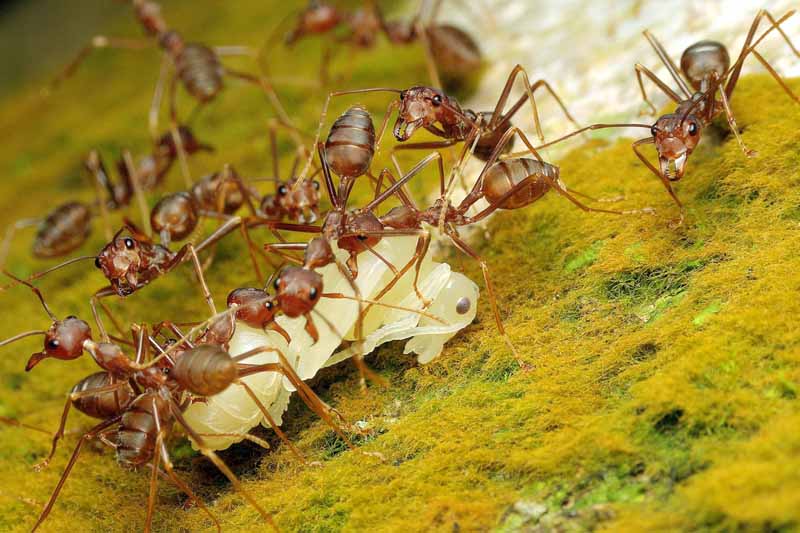
Not limited to apartment buildings, houses, factories, and office buildings, colonies will infest nursing homes and hospitals and can spread more than a dozen types of human diseases.
While you may be able to control them on their own, their success at survival may require the assistance of professional exterminators.
Do you have a horror story of pharaoh ants? Or were you successful in eradicating them? Let us know how you fared in the comments.
And read on for more information on eradicating ant infestations:
© Ask the Experts, LLC. ALL RIGHTS RESERVED. See our TOS for more details. Uncredited photos: Shutterstock
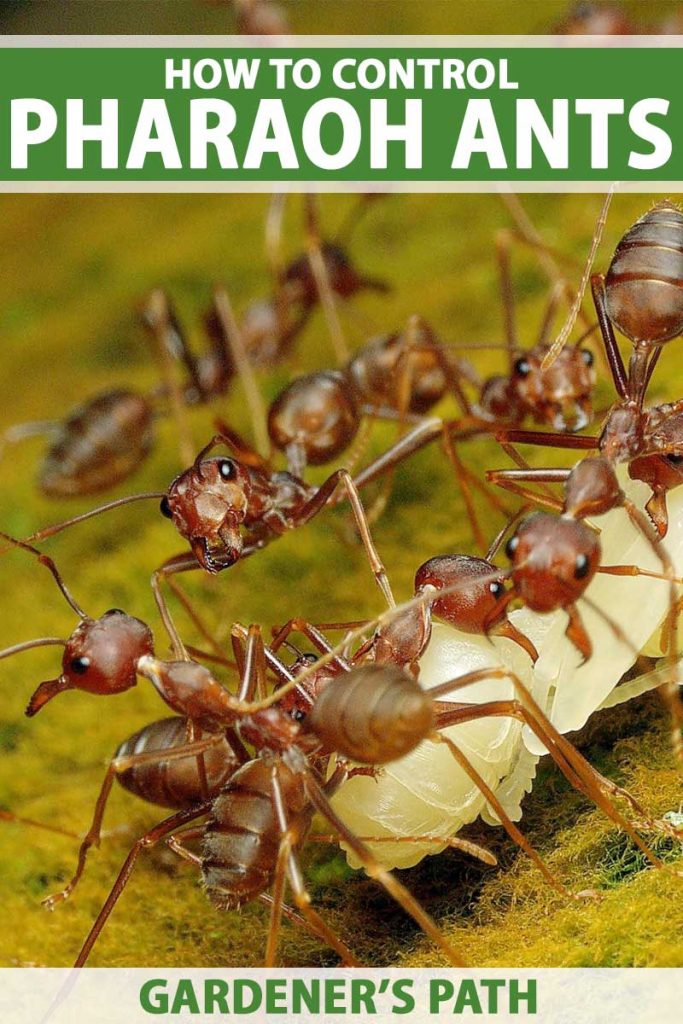
here’s a few of my traps in action. they seem to be working well. wish me luck!
Hi Nick,
Great photos! It looks like they are taking the bait, which bodes really well. I wish you the best! Let us know how the treatment goes for you.
what baits are those?
Gosh, you will need more bait but they’re definitely enjoying it. Are you free of them now?
Did you caulk a lot of areas?
I live in a high rise and the past 4 years have been nightmarish with trying to eradicate the tiny Pharaoh ant! I have washed, wiped cleaned, dried, panicked, restricted cooking, showers, water use, etc. All to keep these from popping up just after I think they are gone! With all foods in containers, no dishes standing, no water except drains, I use Terro Liquid ant bait drooped onto a sticky piece of shelf paper. I’ve learned they can survive longer then I can. They’re always back. Sadly our Pest Control person only does tenants apartments that request it. This… Read more »
Hi Kerry, I’m sorry to hear about your situation, it sounds like you’re doing all the right things. Unfortunately, in a multi-dwelling home, unless the entire building is treated at once, it’s going to be extremely difficult to eliminate the ants. Keep doing what you’re doing to control them in your space and maybe see if the building owner is willing to treat the entire building to get a handle on things.
Thanks for the positive and encouraging note! I just thought wow, where are they? And today I see them in my storage closet! At least I have them out of my bathroom, BLDG maintenance came and closed the hole in the wall where bathroom pipes are. But why my storage room??? It’s hot, dry and no water or food. I’ve put down Terro liquid. They’re at it now. Too many to count. To save my nerves from another Phobia ant attack, I duct taped the whole frame by rollling it sticky side out. I’ve caught a few already on that.… Read more »
I have been suffering with this for the past 2 months in my apartment I have never seen such a thing. I want to cry. As soon as they disappear from one part of the kitchen I see them on the other side of the counter and now they are trying to go into the fridge. Heaven help me because I am using my fridge as my pantry.
They are smart pieces of shits.I hate them. How did you use the duct tape?
Oh I do so feel for you! I have put done liquid Terro drops on mac tac squares I cut myself in the areas I see them the most. Once they start coming to the bait I “seal off” the surrounding area with duct tape rolled inside out. Part of the sticky rolled side, I press onto the floor,and surroundinfg areas to keep them from crawling elsewhere/budding to make another nest. Take a 3 ft long piece of duct tape, place the lenth end onto a flat surface. Roll the other side up and over to stick so you have… Read more »
Hi Kerry, hang in there! Your duct tape solution is ingenious, and keep at it with the traps. Hopefully, the ants will focus on other apartments when they realize that your place is too much bother.
Thanks for your positive and reaffirming reply! But I will seek treatment for my ant phobia as it controls my every day activities and thoughts.
Today marks one week that I’m free of any ants!! I am continuing to wipe all surfaces/cupboards/walls in bathroom/kitchen with alcohol wipes, besides regular cleaning. I mop my floors with borax and hot water once a week but every night I wipe them with papertowel and vingar spray. No ants near the baits for a week now either but I’m leaving them for another week. I also still have rolled “tube like” duct tape/sticky side out,stuck on floor/door frames, to prevent any from “hitchhiking” or escaping for a new nest. I’m also wiping my shoes when coming home from work… Read more »
I have now been “ant free” for 20 days!! I have not seen a single pharoah ant near the bait stations or anywhere! I’ve mixed feelings as my neighbor across the hall has them. I now am trying to figure out a balance so I can live in my apartment ” pharaoh ant” free, but still keep up some defensive methods so I don’t get my neighbors. I was mopping and wiping counters, cupboads twice daily. I will go to once a day, remove my duct tape rolls, bait, but keep the Terro powder on floors under stove and fridge… Read more »
I have been lucky that I am down to 1 to 3 pharaoh scouts a day, often random in the last. On a counter edge, mirror!!, or bathtub. I wondered why. Tonight lying on my couch with pillows, my worst fear came true. They are in my couch! HOW DO I GET RID OF THEM? Pest Control has laughed coming here as I’m “too clean, they’ll be gone in 24 hours!” Now 2 ants crawled on my neck from the sofa pillows and I shook my hair out in the kitchen to catch them. Does anyone know how to get… Read more »
Hi Kerry – oh no! I’m glad to hear that you got the situation mostly under control. You can absolutely run stuff through the dyer to kill the ants. Your best bet is to place baits to draw the few in your place toward them and away from your furniture. Vacuum your carpets and sofas to pick the stragglers up. Best of luck!
Thanks so much for your advice! I did put borax powder over the carpet and the sofa. Laundered and dried all . Suddenly no ants or several days.
Now I found them! I was carrying them from my Bathroom on my sleeve, toothbrush, damp towel. These things are tenacious! I cleaned out vanity and they have come to the liquid poison.!
I think there must be a law in your city about insects? Often pests are not tolerated in apartment dwellings and professional exterminators have to be called in by the management. Have you tried contacting the city to see what your options are?
Are the ants still in the sofa? I heard of these ants going to people’s bedrooms but I can only think that it’s because there’s food there. Although the thought of these ants going on soft items like a sofa (I presume your sofa is from fabric) is grossing me out.
Hi Jania. Thanks for asking. No food allowed outside of our kitchen, and everything is washed, dried, wiped down afterwards. The only thing I can understand is that they “hitchhiked.” And once in a warm place like the couch it only takes one to lay eggs to preserve “the species!” I’ve met a couple upstairs who, despite pest control AND a professional team going in to treat them, are sleeping with them now as well. Their apartment is also very clean so it really has to do with Pharaoh ants multiplying under flooring, in wall voids, electrical outlets, cracks in… Read more »
Thanks for sharing your experience Jania! I’m very pleased to hear that you managed to get rid of the ants.
My condo was flooded and all walls had to be removed 3 feet up from the floor. I was aware of Pharoah ants in the building, but until now had been ant free. I found three coming out of my laundry room on three separate occasions and then one coming out from under the taps in the bathroom after having used the hot water. I’m thinking that they are coming in through the pipes. I was able to purchase some 25% strength vinegar, which many organic house cleaners use. I have been spraying the pipes twice daily and so far… Read more »
Did you get rid of them?